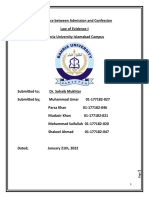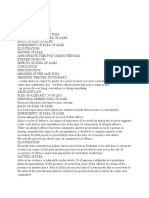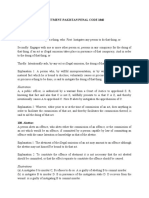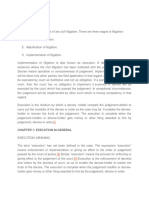0 ratings0% found this document useful (0 votes)
331 viewsEvidentary Value of Accomplice and The Essentiality of Independent Corroboration
Evidentary Value of Accomplice and The Essentiality of Independent Corroboration
Uploaded by
mahnoor parachaThe document discusses accomplices and the need for independent corroboration under Islamic jurisprudence and Pakistan's legal system. It notes that Islamic law requires certain witness qualifications and corroborating evidence. Pakistan's Qanoon-e-Shahadat Order allows accomplice testimony without corroboration, but its illustrations say accomplices are unworthy of credit without material corroboration. The document recommends adding a requirement for independent corroboration to the Qanoon-e-Shahadat Order and bringing laws in line with the Quran and Sunnah per Pakistan's constitution.
Copyright:
© All Rights Reserved
Available Formats
Download as PPTX, PDF, TXT or read online from Scribd
Evidentary Value of Accomplice and The Essentiality of Independent Corroboration
Evidentary Value of Accomplice and The Essentiality of Independent Corroboration
Uploaded by
mahnoor paracha0 ratings0% found this document useful (0 votes)
331 views15 pagesThe document discusses accomplices and the need for independent corroboration under Islamic jurisprudence and Pakistan's legal system. It notes that Islamic law requires certain witness qualifications and corroborating evidence. Pakistan's Qanoon-e-Shahadat Order allows accomplice testimony without corroboration, but its illustrations say accomplices are unworthy of credit without material corroboration. The document recommends adding a requirement for independent corroboration to the Qanoon-e-Shahadat Order and bringing laws in line with the Quran and Sunnah per Pakistan's constitution.
Original Description:
zahish
Original Title
llb zahish
Copyright
© © All Rights Reserved
Available Formats
PPTX, PDF, TXT or read online from Scribd
Share this document
Did you find this document useful?
Is this content inappropriate?
The document discusses accomplices and the need for independent corroboration under Islamic jurisprudence and Pakistan's legal system. It notes that Islamic law requires certain witness qualifications and corroborating evidence. Pakistan's Qanoon-e-Shahadat Order allows accomplice testimony without corroboration, but its illustrations say accomplices are unworthy of credit without material corroboration. The document recommends adding a requirement for independent corroboration to the Qanoon-e-Shahadat Order and bringing laws in line with the Quran and Sunnah per Pakistan's constitution.
Copyright:
© All Rights Reserved
Available Formats
Download as PPTX, PDF, TXT or read online from Scribd
Download as pptx, pdf, or txt
0 ratings0% found this document useful (0 votes)
331 views15 pagesEvidentary Value of Accomplice and The Essentiality of Independent Corroboration
Evidentary Value of Accomplice and The Essentiality of Independent Corroboration
Uploaded by
mahnoor parachaThe document discusses accomplices and the need for independent corroboration under Islamic jurisprudence and Pakistan's legal system. It notes that Islamic law requires certain witness qualifications and corroborating evidence. Pakistan's Qanoon-e-Shahadat Order allows accomplice testimony without corroboration, but its illustrations say accomplices are unworthy of credit without material corroboration. The document recommends adding a requirement for independent corroboration to the Qanoon-e-Shahadat Order and bringing laws in line with the Quran and Sunnah per Pakistan's constitution.
Copyright:
© All Rights Reserved
Available Formats
Download as PPTX, PDF, TXT or read online from Scribd
Download as pptx, pdf, or txt
You are on page 1of 15
EVIDENTARY VALUE OF ACCOMPLICE
AND THE ESSENTIALITY OF
INDEPENDENT CORROBORATION
Project Group Members:
Mahnoor Paracha
Sundar Mahmood
ACCOMPLICE UNDER THE PERSPECTIVE OF
ISLAMIC JURISPRUDENCE
• The Federal Shariat court back in 1991 declared article 16 of
the Qanoon-e-Shahadat Order as un-Islamic
• Islamic law lays down certain qualifications and requirements
for a witness
• The federal Shariat Court interpreted verse number 112 of
Surrah “al-Nisa” and said that this verse refers to the concept
of an approver where Allah says“anyone who earns a fault or
a sin and throws their fault or sin on those who may not be a
sinner he carries falsehood and a flagrant sin”.
• The term Khain also holds immense importance in our
prospective and means a person who betrays trust.
ACCOMPLICE
• Pakistani courts defines accomplice as one who is a partner or
has a relation to the crime committed and is jointly implicated
with another accused, it also indicates that the offenders were
more than one.
• US law defines accomplice , US law as one who actively
participates in the commission of offence with intent.
• Article 16 of Qanoon-e-Shadat Ordinance, 1984. An
accomplice is one who is guilty associates or partners in the
commission of crime or who admits that he has a conscious
hand in the commission of crime.
ACCOMPLICE UNDER PAKISTAN’S LEGAL
SYSTEM
• Qanoon e Shahdat Order , is enshrined under the article that an
accomplice is a competent witness against the other co-
accused even without corroboration. Though it is provided
under the illustrations of article of 129 (b) than an accomplice
is unworthy of credit hence material corroboration shall be
there.
• There seems to be a contradiction in between article 16 and
illustration (b) provided under article 129 of the Qanoon-e-
Shahdat Order 1984.
• The courts in this regard have held that the former is a
provision of law whereas the later is a rule of prudence.
INDEPENDENT CORROBORATION
• The term independent corroboration means literally
that something is free from the influence of anything,
it also means self-governing.
• whether evidence produced by an accomplice can be
corroborated with the hearsay evidence?
• It was held by the court that any hearsay statement
produced by an accomplice cannot be produced
against an accused person but can be made a tool to
corroborate or to impeach a witness’s credit but in no
case they are substantive piece of evidence
RECORDING OF STATEMENT UNDER THE
CODE OF CRIMINAL PROCEDURE,1898
• Code of Criminal Procedure general provisions, as to inquire
and trials a detailed concept tender of pardon to an accomplice
is given, sections varying from 337 to 339-A of CrPC.
• Any trial of whose punishment may extend to 10 years or is
punishable under section 211 of the Pakistan Penal Code or
section 216-A, 369, 401, 135, 477-A, the prosecution at any
stage of trial to obtain evidence may tender a pardon to a
person who directly or indirectly took part in the commission
of that offence.
BHUTTO CASE IN CONTRADICTION WITH
CrPC
• No accomplice can be made in Hudood and Criminal cases
unless and until there is corroboration of an evidence to punish
the accused. But Judgment in Zulfiqar Ali Bhutto case is in
contradiction with this point.
• Zulfiqar Ali Bhutto v. The State
• Bhutto was convicted and later hanged on the testimony of an
accomplice and hearsay evidence .
RECOMMENDATIONS
1. Independent corroboration is necessary whenever an accomplice put
forwards his evidence before the court as a prosecution witness.
2. The term independent corroboration be added in the existing article
of the QSO ,1984.
• The term independent corroboration be added within QSO,1984, the
courts in Pakistan have considered it safe to convict an accused on
the sole testimony of an accused whereas on the in the other legal
regimes it has not only been termed as dangerous but some legal
regimes have totally and wholly rejected this concept.
3. Existing article be brought within the ambit of Quran and Sunnah
as per article 227 of the Constitution of Pakistan.:
• under article 227 of the Constitution of Pakistan it is mandatory
upon the state to bring all exsisting laws within the ambit of
injunction provided in the Holy Qurran and Sunnah of the Prophet.
• They have also made the verse of the Holy Quran a part of their
judgment where it is stipulated that if information is brought to you
by a Khayn then you must check it from other sources.
• They have not declared the article under discussion repugnant to
Islam whereas they have also declared sections varying from 337-
339-A of the code of Criminal Procedure Code repugnant to the
Injunctions of Islam.
Thank you
You might also like
- Conflict Between Law and Equity and The Application of Equity in PakistanDocument15 pagesConflict Between Law and Equity and The Application of Equity in PakistanAdv Sohail Bhatti50% (2)
- Certificat de Residence Fiscale FRDocument6 pagesCertificat de Residence Fiscale FRDana NanuNo ratings yet
- Qanoon e Shahadat ASSIGNMENTDocument11 pagesQanoon e Shahadat ASSIGNMENTumaima aliNo ratings yet
- CR PCDocument9 pagesCR PCZ_JahangeerNo ratings yet
- Article 4 & 5 of QSO 1984Document4 pagesArticle 4 & 5 of QSO 1984ایڈووکیٹ اعجاز احمد راجپوتNo ratings yet
- Identification Parade AssignmentDocument10 pagesIdentification Parade AssignmentAbdul Rehman100% (1)
- Law of Evidence in Pakistan 1 PDFDocument41 pagesLaw of Evidence in Pakistan 1 PDFtaha_shakir5280% (5)
- Impo QSODocument57 pagesImpo QSOMubashar Dilawar Khan Khattak100% (3)
- Arrest Without Warrant DefinitionDocument2 pagesArrest Without Warrant DefinitionZeesahn100% (1)
- Complaint Under CR.P.C 1898 - The Law StudyDocument1 pageComplaint Under CR.P.C 1898 - The Law StudyNajeebullah KardaarNo ratings yet
- LAW of EVIDENCE - II - Examination of Witnesses, Leading QuestionsDocument8 pagesLAW of EVIDENCE - II - Examination of Witnesses, Leading QuestionssupervuNo ratings yet
- Concept of Primary and Secondary Evidence QSO With Case LawsDocument10 pagesConcept of Primary and Secondary Evidence QSO With Case LawsAli javaidNo ratings yet
- Section 164, 364 & 533Document20 pagesSection 164, 364 & 533wasim ahmedNo ratings yet
- False Evidence AND Offences Against Public Justice First LactureDocument26 pagesFalse Evidence AND Offences Against Public Justice First LactureHaseeb Khan100% (3)
- Importance and Evidential Importance of Identification Parade in Criminal Case SynopsisDocument11 pagesImportance and Evidential Importance of Identification Parade in Criminal Case Synopsisadv.sanakhan100% (3)
- Tazkiyah Al Shahood by Kamran ZaiBDocument9 pagesTazkiyah Al Shahood by Kamran ZaiBKamran Zaib100% (4)
- Dying Declaration: Statement Made by A Person Who Cannot Be Called As WitnessDocument6 pagesDying Declaration: Statement Made by A Person Who Cannot Be Called As WitnessAmina Aamer100% (1)
- Qanun e ShahadatDocument11 pagesQanun e ShahadatMuhammad Idrees50% (2)
- The Concept of Bail in The Laws of PakistanDocument8 pagesThe Concept of Bail in The Laws of PakistanBangash HamadNo ratings yet
- The FIR in Pakistan, Under CRPCDocument6 pagesThe FIR in Pakistan, Under CRPCAizaz Alam100% (2)
- Section 10 IEADocument6 pagesSection 10 IEAAakash Singh SuryvanshiNo ratings yet
- Competency of WitnessDocument5 pagesCompetency of WitnessYasir Abbas Qasimi100% (1)
- Admission and ConfessionDocument11 pagesAdmission and ConfessionLagend UmarNo ratings yet
- 164 CRPCDocument8 pages164 CRPCsaket anand50% (2)
- False Evidence AND Offences Against Public Justice - Second LactureDocument27 pagesFalse Evidence AND Offences Against Public Justice - Second LactureHaseeb KhanNo ratings yet
- Difference Between Admission and ConfessionDocument3 pagesDifference Between Admission and ConfessionToheedullahNo ratings yet
- Question 2/11: What Is Primary Evidence? Discuss Its Scope and ImportanceDocument3 pagesQuestion 2/11: What Is Primary Evidence? Discuss Its Scope and Importancemoriarty lol100% (1)
- Plea of AlibiDocument3 pagesPlea of AlibiIkra Malik100% (1)
- QazafDocument4 pagesQazafMaher AfrasiabNo ratings yet
- Confession and AdmissionDocument2 pagesConfession and AdmissionAdv Zafar AliNo ratings yet
- Q.S.O Notes SeharDocument7 pagesQ.S.O Notes SeharSehar TurkNo ratings yet
- False Evedence PPCDocument8 pagesFalse Evedence PPCAbdul Hamid Bhatti100% (1)
- Abetment-Pakistan Penal Code 1860 Abetment Defined: 107. Abetment of A ThingDocument12 pagesAbetment-Pakistan Penal Code 1860 Abetment Defined: 107. Abetment of A ThingDaud Aziz0% (1)
- 163 Qanun-e-ShahadatDocument148 pages163 Qanun-e-ShahadatSaddy MehmoodbuttNo ratings yet
- Dying Declaration-1Document12 pagesDying Declaration-1Ali Raza GillNo ratings yet
- The Qanun-e-Shahadat Order, 1984Document54 pagesThe Qanun-e-Shahadat Order, 1984Atif Rehman100% (1)
- Complete Notes On CRPCDocument71 pagesComplete Notes On CRPCAfrasiab Hassan100% (1)
- 1.unlawful AssemblyDocument3 pages1.unlawful AssemblyFaique Memon0% (1)
- CLass 09 Qanoon e Shahadat (Law of Evidence)Document22 pagesCLass 09 Qanoon e Shahadat (Law of Evidence)Wajahat Ghafoor100% (1)
- CRPC 154 &161Document8 pagesCRPC 154 &161saad rasheedNo ratings yet
- Doctrine of Res-GestaeDocument5 pagesDoctrine of Res-Gestaegaurav singhNo ratings yet
- The Punjab Industrial Relations Act 2010Document18 pagesThe Punjab Industrial Relations Act 2010Rana Faisal Bashir Pavar100% (1)
- Qanoon e Shahdat & Legal EthicsDocument43 pagesQanoon e Shahdat & Legal EthicsMohsen Khan100% (2)
- What Are The Functions of Provincial Bar Council?Document4 pagesWhat Are The Functions of Provincial Bar Council?Areej AttaNo ratings yet
- The Limitation Act, 1908Document6 pagesThe Limitation Act, 1908Atif RehmanNo ratings yet
- Punishment in PPCDocument6 pagesPunishment in PPCjim125No ratings yet
- S Only Notespecific Relief ActDocument24 pagesS Only Notespecific Relief ActRahul TandelNo ratings yet
- Criminal ConspiracyDocument2 pagesCriminal ConspiracyEsha JavedNo ratings yet
- Scope of Section 27 of Indian Evidence Act: Submitted byDocument26 pagesScope of Section 27 of Indian Evidence Act: Submitted bySweta SamvediNo ratings yet
- Criminal Procedure Code in PakistanDocument25 pagesCriminal Procedure Code in Pakistanyouni_200550% (2)
- Qanoon e Shahadat Order 1984Document2 pagesQanoon e Shahadat Order 1984Ijaz Ahmad ChaudharyNo ratings yet
- CR.P.C - Arrest: ShardaDocument41 pagesCR.P.C - Arrest: ShardaRohit GargNo ratings yet
- Evidence LawDocument10 pagesEvidence LawHeena ShaikhNo ratings yet
- Law of Public Nuisnaces in PakistanDocument7 pagesLaw of Public Nuisnaces in PakistanKashif Mehmood100% (2)
- Qanoon Shahadat Ordinance 1984 NotesDocument22 pagesQanoon Shahadat Ordinance 1984 NotesHabibullah YusufzaiNo ratings yet
- Meaning Object of Granting Bail Bailable and Non-Bailable Offences First Schedule of CR.P.CDocument9 pagesMeaning Object of Granting Bail Bailable and Non-Bailable Offences First Schedule of CR.P.CAbhilasha KushwahNo ratings yet
- CR.P.C and Medical JurisprudenceDocument54 pagesCR.P.C and Medical JurisprudenceMohsen KhanNo ratings yet
- Concept of Execution - CPCDocument13 pagesConcept of Execution - CPCAnonymous H1TW3YY51KNo ratings yet
- Harbouring Offender: A Need To Revisit: September 2018Document18 pagesHarbouring Offender: A Need To Revisit: September 2018Abhigyat Chaitanya100% (1)
- Abetment: Discuss in Details The Modes of Abetment With Relevant Case LawDocument5 pagesAbetment: Discuss in Details The Modes of Abetment With Relevant Case LawSyed Ibrahim HassanNo ratings yet
- Evidentary Value of Accomplice: Project Group Members: Mahnoor Paracha Sundar MahmoodDocument17 pagesEvidentary Value of Accomplice: Project Group Members: Mahnoor Paracha Sundar Mahmoodmahnoor parachaNo ratings yet
- Bring A Story To LifeDocument1 pageBring A Story To Lifemahnoor parachaNo ratings yet
- Bring A Story To LifeDocument2 pagesBring A Story To Lifemahnoor parachaNo ratings yet
- Critical Analysis of Asia Bibi Case: Assignment No.2Document11 pagesCritical Analysis of Asia Bibi Case: Assignment No.2mahnoor parachaNo ratings yet
- 306800131-CPC-Setting-Aside-of-Sale (Recovered)Document15 pages306800131-CPC-Setting-Aside-of-Sale (Recovered)mahnoor parachaNo ratings yet
- According To The ShariDocument10 pagesAccording To The Sharimahnoor parachaNo ratings yet
- Evidentary Value of Accomplice: Project Group Members: Mahnoor Paracha Sundar MahmoodDocument17 pagesEvidentary Value of Accomplice: Project Group Members: Mahnoor Paracha Sundar Mahmoodmahnoor parachaNo ratings yet
- That Court Can Decline The Application of Amendment of Pleadings If It Is Debarred by The Limitation ActDocument5 pagesThat Court Can Decline The Application of Amendment of Pleadings If It Is Debarred by The Limitation Actmahnoor parachaNo ratings yet
- Why Replicate DNA?: Key TakeawaysDocument1 pageWhy Replicate DNA?: Key Takeawaysmahnoor parachaNo ratings yet
- Digests in Crim JloDocument84 pagesDigests in Crim JloRobinson AntonioNo ratings yet
- 1Document9 pages1Avinash BagadeNo ratings yet
- Department of Labor: 98 166Document42 pagesDepartment of Labor: 98 166USA_DepartmentOfLaborNo ratings yet
- Criminal Procedure SLU BaguioDocument68 pagesCriminal Procedure SLU BaguiohansNo ratings yet
- Emergency Provisions in IndiaDocument7 pagesEmergency Provisions in IndiaSonia SabuNo ratings yet
- 879 Eltron Energy PVT LTDDocument1 page879 Eltron Energy PVT LTDHaseeb TyzNo ratings yet
- Bureau of Customs Memo On Mandatory Xray Inspection of All Shipments Tagged RedDocument1 pageBureau of Customs Memo On Mandatory Xray Inspection of All Shipments Tagged RedPortCallsNo ratings yet
- Augustin International Center V Bartolome DigestDocument2 pagesAugustin International Center V Bartolome DigestJuan Doe50% (2)
- Law and Contract Management ExaminationDocument51 pagesLaw and Contract Management ExaminationMdms PayoeNo ratings yet
- Parent Country NationalDocument1 pageParent Country NationalFiza MushtaqNo ratings yet
- CIT Vs Ople (Digest)Document3 pagesCIT Vs Ople (Digest)JaniceNo ratings yet
- CAM EncodedDocument2 pagesCAM EncodedChaNo ratings yet
- Javellana Vs Executive Secretary (Digest)Document10 pagesJavellana Vs Executive Secretary (Digest)Bianca Bnc100% (6)
- Code of Civil Procedure, 1908Document3 pagesCode of Civil Procedure, 1908somya jainNo ratings yet
- Mohammad - Ismail - 11 QC LAW Client - Unable To Act1Document1 pageMohammad - Ismail - 11 QC LAW Client - Unable To Act1Marc WilsonNo ratings yet
- Batangas CATV Vs CADocument8 pagesBatangas CATV Vs CAJamiah HulipasNo ratings yet
- Human Rights, Sexual Orientation and Gender Identity in The CommonwealthDocument568 pagesHuman Rights, Sexual Orientation and Gender Identity in The CommonwealthKinDread Ace Meroë100% (1)
- EEUU Acusación Red Álex SaabDocument19 pagesEEUU Acusación Red Álex SaabAlbertoNewsNo ratings yet
- Eagle Star vs. Chia YuDocument5 pagesEagle Star vs. Chia Yucarpediem0513No ratings yet
- Phoenix Construction v. IAC FactsDocument10 pagesPhoenix Construction v. IAC FactsMP ManliclicNo ratings yet
- Castillo v. de Leon-CastilloDocument2 pagesCastillo v. de Leon-CastilloElaine HonradeNo ratings yet
- Electoral Commission of Zambia NotesDocument8 pagesElectoral Commission of Zambia NotesAkamonwa Kalenga100% (1)
- Validation of Title IV-A - Iv-D DebtDocument4 pagesValidation of Title IV-A - Iv-D Debtpanamahunt22100% (9)
- FABIANA C. VDA. DE SALAZAR, Petitioner, Court of Appeals, Primitivo Nepomuceno and Emerenciana Nepomuceno, RespondentsDocument2 pagesFABIANA C. VDA. DE SALAZAR, Petitioner, Court of Appeals, Primitivo Nepomuceno and Emerenciana Nepomuceno, RespondentsAbdul-Hayya DitongcopunNo ratings yet
- Motion To Take Oral DepositionDocument3 pagesMotion To Take Oral DepositionHershey GabiNo ratings yet
- MCBURNIE Vs GANZONDocument4 pagesMCBURNIE Vs GANZONChiaraNo ratings yet
- Fox News Poll January 5-8, 2020: WisconsinDocument11 pagesFox News Poll January 5-8, 2020: WisconsinFox News0% (2)
- Agency Reviewer PDFDocument61 pagesAgency Reviewer PDFKeempen Brian Bernadas100% (1)
- Mankoff Putin's Foreign PolicyDocument53 pagesMankoff Putin's Foreign PolicyCatalina Labes Horoiu100% (1)
































































































